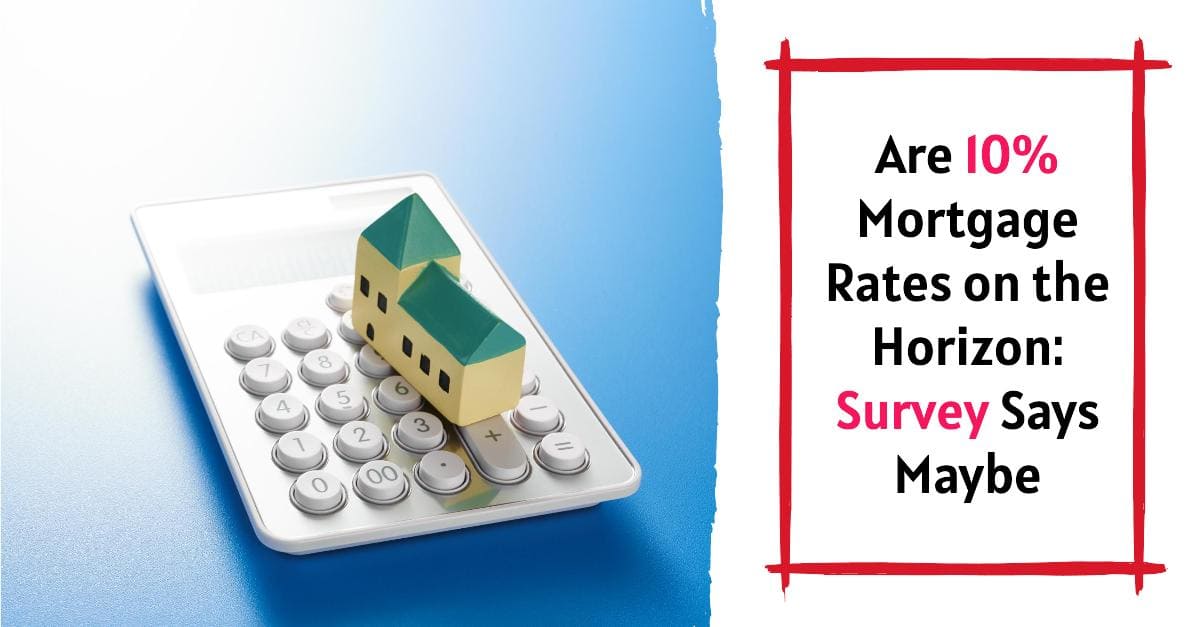
A recent survey by the New York Fed has sent shivers down the spines of aspiring homeowners. The survey paints a picture of consumers anticipating a dramatic rise in mortgage rates, potentially reaching a staggering 10% within three years. This prediction, if it comes true, would mean mortgage rates doubling in a relatively short period.
Survey Predicts 10% Mortgage Rates in 3 Years
This forecast is a significant departure from what we’ve seen historically. The survey indicates a sharp shift in consumer sentiment, with households expecting a jump to a hefty 8.7% in mortgage rates within the next year, followed by an even steeper climb to 9.7% over the next two years. These figures are unprecedented in the survey’s history and have major implications for the housing market.
For potential homebuyers, this translates to a potential gut punch. Higher mortgage rates mean significantly higher monthly payments, forcing many to tighten their belts and potentially delay their dreams of homeownership. Current homeowners with variable-rate mortgages may also feel the pinch, especially if they were considering refinancing to lock in a lower rate.
However, there’s a silver lining, or perhaps a more realistic outlook. The survey also suggests a slight uptick in homeowners planning to refinance in the next year. This indicates a collective effort to secure lower rates before they potentially shoot up.
A Market Divided: Optimism Meets Caution with Historical Context
The survey offers a more nuanced view of the housing market’s future than just rising rates. While a significant portion of consumers expect rates to climb, there’s also a nearly even split (49.1%) who believe rates could fall over the next year. This highlights the uncertainty surrounding the market, with cautious optimism battling pragmatic concern.
It’s important to remember that this survey reflects expectations, not guarantees. But it’s a powerful indicator of consumer sentiment. When a large number of potential homebuyers anticipate a sharp rise in borrowing costs, it can lead to a slowdown in the housing market. People might choose to postpone buying a home or seek more affordable options to cope with potentially higher monthly payments.
Potential Impact of Rising Mortgage Rates
This scenario could play out in a few ways. First, a decrease in demand for homes is likely, putting downward pressure on housing prices. This could be good news for potential buyers, making homes more affordable. However, it could also create instability in the housing market, impacting everything from construction to real estate agent commissions.
Secondly, rising mortgage rates would undoubtedly affect affordability. With higher borrowing costs, the same monthly payment would only buy you a less expensive home. This could price some potential buyers out of the market entirely, particularly those with a fixed budget.
The impact wouldn’t be felt solely by buyers. Sellers may also need to adjust their expectations. In a market with fewer buyers and potentially lower prices, homes might take longer to sell. This could lead to a period of adjustment for sellers who may be accustomed to a faster-paced market.
The housing market is a complex ecosystem, and a rise in mortgage rates would have ripple effects throughout the industry. Builders may be hesitant to start new construction projects if they anticipate a decrease in demand. This could lead to a shortage of homes on the market in the future, further impacting affordability.
The Fed: The Wildcard and Long-Term Considerations
The Federal Reserve plays a key role in influencing interest rates, and its actions will be crucial in determining the accuracy of this consumer forecast. If the Fed raises interest rates to combat inflation, it could very well lead to the predicted surge in mortgage rates. However, the Fed also walks a tightrope, needing to balance its actions to avoid hindering economic growth.
The coming months will be critical in observing how the Fed navigates this situation. Homebuyers are clearly worried, and the housing market waits with bated breath to see if these anxieties become reality. This situation warrants close attention, especially for those hoping to buy a home soon.
While the survey results are noteworthy, it’s important to consider them within the context of long-term trends. Historically, mortgage rates have fluctuated, experiencing periods of both highs and lows. Even if rates rise in the near future, they may not stay that high forever.
The Bottom Line:
The New York Fed survey serves as a valuable compass, offering insights into consumer sentiment and potential shifts in the housing market. But remember, knowledge is power. Here are some steps you can take to stay informed and prepared, regardless of whether you’re a seasoned investor or a nervous first-time buyer:
- Do Your Research: Stay up-to-date on economic news and trends that could impact mortgage rates. The Federal Reserve’s website and financial news outlets are good resources.
- Get Pre-Approved for a Mortgage: Pre-approval clarifies your borrowing power and strengthens your offer when you find the right home. It also gives you a clear picture of what you can afford, even if rates fluctuate.
- Work with a Trusted Realtor: A good realtor can guide you through the intricacies of the buying process, especially in a changing market. They can help you find homes that fit your budget and negotiate effectively with sellers.
- Consider All Costs: Don’t just focus on the monthly mortgage payment. Factor in homeowners insurance, property taxes, and potential maintenance costs to get a true picture of affordability.
- Build a Strong Financial Buffer: Having a healthy emergency fund can provide peace of mind if unexpected expenses arise, especially if your monthly housing costs increase due to rising rates.
- Be Flexible: If rates do rise, you may need to adjust your expectations. Be open to considering different neighborhoods, home sizes, or even different types of properties altogether.
Remember, the housing market is cyclical. While rising rates pose a challenge, they may also present opportunities. By staying informed, prepared, and adaptable, you can navigate this market with confidence and make sound decisions that align with your long-term goals.









